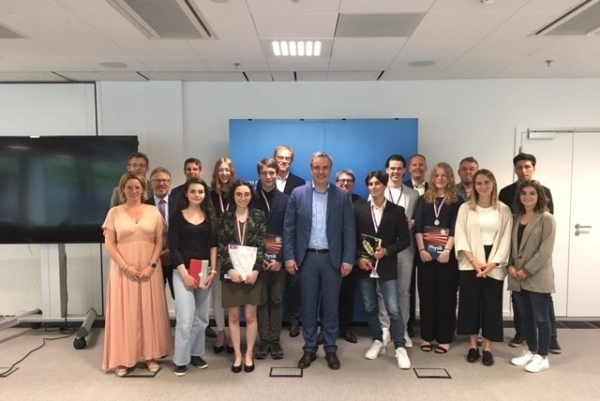 Credit: MENEJ
Credit: MENEJ
On Friday 3 June 2022, Luxembourg's Minister of Education, Children and Youth, Claude Meisch, congratulated during a small ceremony the Luxembourg teams who brilliantly competed in the European Olympiad of Experimental Sciences 2022 and the laureate of the International Philosophy Olympiad, Lavinia Nemes, a pupil of the Lycée de Garçons de Luxembourg, who won a silver medal in Lisbon at the end of May 2022.
Minister Meisch said: “In Luxembourg, high schools are a place where young people can flourish, discover their talents, live their passions. Where they find the courage to compete with others and push their limits. The distinctions collected at the Olympiads of philosophy and experimental sciences make the image of the Grand Duchy shine at the international level”.
Organised in Hradec Kralové (Czech Republic) from 8 to 14 May 2022, the scientific competition brought together 20 countries from the European Union (EU) and six students per country. Luxembourg was represented by the two winning teams of the fifteenth Luxembourg Natural Science Olympiad.
Team A consisted of Nina Bernier (Lycée de garçons de Luxembourg), Siena Ootes (European School I) and Moritz Rohner (Lycée de garçons Esch). Team B consisted of Joé Werdel (Lycée de garçons de Luxembourg), Melinda Koch (European School I) and Massimo Comparetto (Lycée de garçons de Luxembourg).
The apprentice scientists were accompanied by Caroline Steffen, biology teacher (Lycée technique agricole), Gilles Backes, chemistry teacher (Lycée de garçons de Luxembourg), Jacques Weydert, physics teacher (Lënster Lycée International School), and Jeff Kohnen, president of the Luxembourg Olympiad of Natural Sciences asbl (Olympiades luxembourgeoises des sciences naturelles - OLSN).
A gold medal for the first time!
The Luxembourg teams have achieved excellent results and by far the best so far. Indeed, Team A placed fourth out of 40 teams and won a gold medal, a first for a Luxembourg team participating in a Natural Science Olympiad. Team B also excelled with a nineteenth place finish and a silver medal.
Challenges and encounters
During two days of competition, young scientists aged fifteen to seventeen had to carry out experiments in biology, chemistry and physics, in teams of three. During four-hour sessions, they explored scientific questions related to hyaluronic acid and DNA, and performed tasks in these three areas using the analytical approach, the accuracy of gestures and a good team spirit.
At the same time as the competition, the emphasis was placed on exchanges between the 120 students and the discovery of the host city. For Luxembourgers, meeting 114 other young people of the same age with the same interests was a very special experience. The Olympiads make it possible to forge long-term friendships, the foundations of the European scientific network of future.








